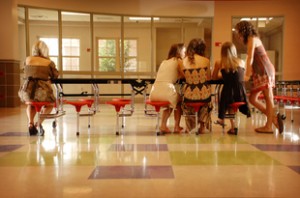
There are actually many positives to being in social groups during the teen years,” said Adams, an associate professor of educational leadership, policy and technology studies at UA.
“Social groups provide a sense of community and support. This is where many people find their life-long friends,” said Adams. “These groups also teach basic social skills such as negotiation, compromise, teamwork and communication,” she added
That said, Adams noted that social groups differ from cliques. “In social groups, members are free to socialize and hang out with others outside the group without worrying about being cast out. They may not do everything together — and that’s ok,” she said.
So, what’s the appropriate role for a parent to take when their children are navigating the social scene in high school?
“There’s a fine line between being a helicopter parent who hovers over their child and makes every decision for them and being an involved parent who allows their children to make mistakes and recognize that those are places and opportunities to grow,” Adams said.
“It’s not the end of the world if your child is not invited to a sleepover or if somebody says something ugly to your child. These are, in fact, opportunities for your child to grow in character.
“Let you child fight his/her own battles.”
Of course, Adams said, parents should not be totally hands-off.
“If the situation crosses over into the realm of harmful behavior – your child is being bullied or hazed – then, as a parent, it is your responsibility to get involved.”
Source: University of Alabama via Newswise
